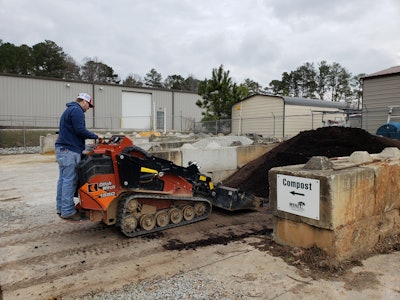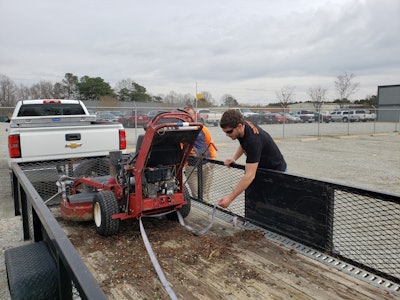 Photo: Myatt Landscaping
Photo: Myatt LandscapingYesterday, we talked to green industry experts and students with an affinity for landscaping about what drew them to this field, as well as what can be done to help grow more student interest in these types of careers.
Take a look at what types of jobs Matthew Pendleton, a freshman in the Agriculture Institute at North Carolina State University, and Cameron Burcham, a senior at West Johnson High School in Benson, North Carolina, have had the chance to work on, as well as the lessons they’ve learned as young green industry professionals.
Getting your hands dirty
Work experience
While most of his work experience comes from working with his family on their farm in rural North Carolina, Pendleton says he also had the opportunity to work for a local landscaping company doing residential and community landscape projects.
After starting at NC State, Pendleton says he then was able to work with a local tree service company performing both commercial and residential tree care services.
During his time working with these companies, Pendleton says he’s learned a lot about green industry work, but he’s also learned valuable lessons about working with others.
“The biggest lesson that stood out to me was having to deal with many types of personalities on a given day,” says Pendleton. “Having previously only worked with members of my family, I had not had much experience with conflicting personalities. However, after working in the landscape industry for a while, I learned to deal and work with all kinds of people.”
A major lesson Pendleton says he’s taken from his green industry work so far is to always show respect to nature.
“Since this is the largest part of the industry, it is important to fully understand what you are working with and know how it should be treated,” says Pendleton.
Having interned with Myatt Landscaping last summer, Burcham says he had the opportunities to work on both installation and maintenance projects.
 Photo: Myatt Landscaping
Photo: Myatt LandscapingThrough these jobs, Burcham says he was able to learn how to operate equipment like skid steers and excavators, discover new methods for planting and caring for plants and learn the processes for developing landscape design blueprints.
Burcham says that his favorite part of working with Myatt Landscaping was the variety he experienced when coming into work every day.
“I liked being able to do different things, work at different sites and learn new skills,” he says. “I enjoyed working with my hands and felt like I was making a difference in the world around me. I was encouraged and felt appreciated for my hard work. The biggest lesson I learned from Myatt was that if you put in the time and make the effort, you will be successful.”
While his career plans have not been finalized just yet, Burcham says if he does decide to pursue a career in the green industry, he would like to further explore the areas of landscape design and installation.
Stressing the importance of the green industry
Taking it seriously
While there are many out there who fully understand what it takes to work in the green industry, there are still negative perceptions than can sometimes keep students from pursuing these fields.
“I think in today’s society, many people believe jobs in the green industry require too much work and don’t pay as well,” says Burcham. “In my opinion, most kids my age are handed whatever they want on a silver platter. In my family, we were taught you have to work for what you want out of life. For those few that understand hard work pays off, it is taken seriously and can be an attractive and rewarding professional career.”
According to Pendleton, many discredit the importance of green industry experts because they believe green industry jobs can be boiled down to DIY projects, such as mowing their own lawns, planting their own ornate flower beds, installing their own hardscapes and more.
“I don’t feel that it is looked at seriously because it is often something that many people feel that they can do on their own,” says Pendleton. “Oftentimes, people do not look at it as a career or especially one that you could go to school to get educated in.”
Another major factor affecting students in the green industry is parental and family support.
Pendleton says that although his parents were skeptical at first when he talked to them about his plans to pursue the green industry on a collegiate level, he said they soon came around to the idea and now fully support him.
“Some parents are supportive of their children’s interests, and some are not,” says Caitlin Clineff, recruiting specialist and company ambassador with Myatt Landscaping Concepts. “They think it’s not a prestigious job or that their child won’t be making as much money as they could doing something else. We had one intern whose mother would not let her go into a greenhouse career, and instead pushed her toward ag law. The irony is that there are a lot more opportunities in the green industry than there are for lawyers right now.”
The question now becomes not only how can you draw interested students into this industry, but also, how can you convince their parents that this field can, in fact, turn into a thriving career?
Check back tomorrow for part 3 of this series, where we’ll see what your landscaping company can do to draw more students to the green industry.











